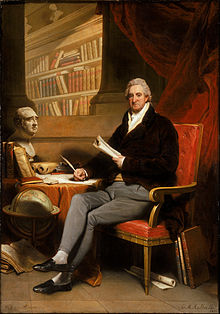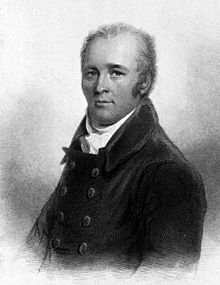Extract from ‘The History of The Athenaeum – 1797-1997’.

William Roscoe 1753-1831
President 1803-04 and one of The Athenaeum’s founders
Historian, poet, lawyer, banker, naturalist, opponent of the slave trade and collector of books and works of art, his influence on the cultural life of Liverpool was immense. H is best described by the American author Washington Irving, who wrote “One of the first places to which aa stranger is taken in Liverpool is the Athenaeum… it contains a good library, a spacious reading room and is the great literary resort of the place”. In The Athenaeum, Washington Irving saw a tall figure with a oman style of countenance. “I enquired his name and was informed it was Roscoe. I drew back with involuntary feeling of veneration. This then was… one of those men whose voices have gone forth to the ends of the earth. Born in a place apperently uncongenial to the growth of literally talents, in the very market-place of trade, without fortune, family connections or patronage; self-prompted, self-sustained and almost self-taught, he has conquered every obstacle, achieved his way to eminence and having become one of the ornaments of the nation, has turned the whole force of his talent and influence to advance and embellish his native town.”
One of the important treasures of The Athenaeum is the Roscoe Collection of books and manuscripts, boght by some of his friends at the sale of his books in 1815 and presented to The Athenaeum so that he and future generations could continue to make use of them. Of Roscoe’s connection with The Athenaeum we can rightly say “Si monumentum requiris, circumspice“. (If you seek his monument, look around.
William Roscoe was a leading advocate for the abolition of slavery and today is best known as one of England’s first abolitionists.

James Currie 1756-1805
President 1801-02 and one of The Athenaeum’s founders
A Scotsman and physician who studied at Edinburgh and received his MD degree from Glasgow University. One of the best physicians in Liverpool, he took up the plight of the French prisoners of war in Liverpool and was an opponent of the slave trade.
His main claim to fame is literary. He was the first biographer of Robert Burns and edited the first collected edition of Burns’ work, published in Liverpool in 1800, after Burns’ death. The aim of the work was to assist Burns’ widow and children to consolidate his poetic reputation. It was successful in both respects, despite criticism that Currie lacked personal knowledge of Burns. A recent biographer of Burns, Ian McIntyre wrote “Currie’s efforts had added the sum of £1,200.00 to the trust fund for Burns’ family and it was also thanks to James Currie that within two decades of his death, the name Robert Burns was known throughout the English speaking world.”
With Roscoe and Reverend W. Shepherd, Currie was at the centre of a literary group, dissenters in religion and radicals in politics. These three gentlemen were all instrumental in the abolition movement.
